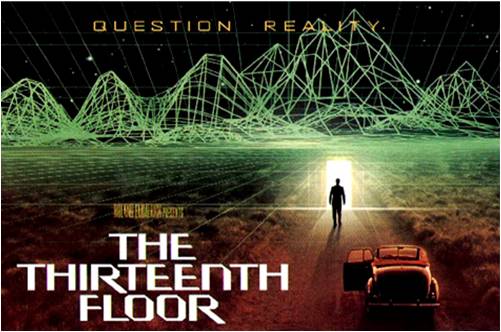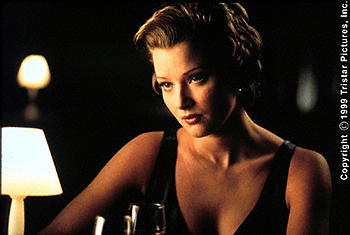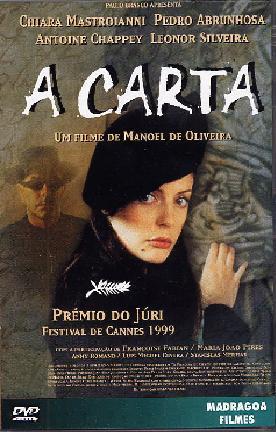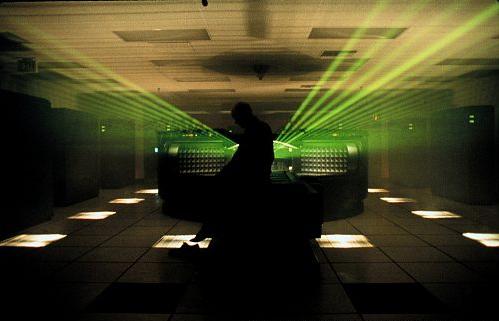From the June 4, 1999 Chicago Reader. A lot of the material here subsequently turned up in my book Movie Wars. — J.R.
The Thirteenth Floor
Rating * Has redeeming facet
Directed by Josef Rusnak
Written by Rusnak and Ravel Centeno-Rodriguez
With Armin Mueller-Stahl, Craig Bierko, Gretchen Mol, Vincent D’Onofrio, Dennis Haysbert, and Steven Schub.
“I think, therefore I am,” reads the opening epigraph of The Thirteenth Floor, followed by the quotation’s source, “Descartes (1596-1650).” It’s an especially pompous beginning for a movie whose characters barely think, much less exist, but not too surprising given the metaphysical claims and pronouncements that usually inform virtual-reality thrillers.
This is the fourth such thriller I’ve seen in as many weeks, and if any thought at all can be deemed the source of these pictures cropping up one after the other — with the exception of David Cronenberg’s eXistenZ, a film with more than generic commercial kicks on its mind — it might be an especially low estimation of what an audience is looking for at the movies. The assumed desire might be expressed in infantile and emotional terms: “I don’t like the world, take it away.” In other words, for filmmakers stumped by the puzzle of how to address an audience assumed to be interested only in escaping without reminding them of what they’re supposed to be escaping from, virtual-reality thrillers seem made to order. They imply significance by indulging in glib self-referential hints that movies are just a form of dreaming anyway, imply that anything that suggests the real world is — or might as well be — a hallucination, and are usually “thoughtful” enough to include gobs of violence on the assumption that even if the world is no longer desirable, kicking ass for any reason at all is. And in the cases of The Matrix and The Thirteenth Floor, the two studio blockbusters in the batch (the other two are Open Your Eyes and eXistenZ), a worshipful attitude toward digital technology appears to be the only factor that justifies dressing up the conceits about alternative realities as science fiction instead of as some less prestigious and more hybrid form like science fantasy. As the press book for The Thirteenth Floor eagerly puts it, “Over 2,000 years ago, Plato postulated that the ‘real’ world exists only in our imagination. The technology of modern society has begun to prove Plato’s point.” Thanks a lot, modern society; tough luck, Kosovo Albanian and Serb civilians.
At the beginning of most movies, including quite a few bad ones, there’s a period of relative grace, when exciting possibilities still hover. Broadly speaking, the same experience of both mystery and potentiality presides at the beginning of film festivals, when a bunch of titles, directors, actors, countries, and catalog descriptions seems to portend all sorts of things. Disappointment generally follows when the promises aren’t kept and dreams go unfulfilled, except on those interesting occasions when expectations get revised on the spot and unforeseen pleasures start to emerge. More often, expectations gradually become narrowed down to accept familiar, shopworn routines — the kind that our experts inform us are the only things sure to sell (except for when they don’t).
I have to admit that The Thirteenth Floor kept me hoping for the first half hour or so, before it turned into another virtual-reality boondoggle. The press screening was held the morning after the prizes at the Cannes film festival were announced. Since I didn’t attend I still have months or in some cases years to wait before the movies showing there have a chance to disappoint me. You might say that this is my own virtual-reality game, playable in different ways in terms of both The Thirteenth Floor and the Cannes festival I didn’t attend, though the difference between waiting half an hour and waiting several months is not to be sneezed at: in the latter case, for instance, I have to worry more about all the misinformation that’s likely to gum up my expectations in the interim.
The Thirteenth Floor begins with Hannon Fuller (Armin Mueller-Stahl) in a hotel room writing a letter, portions of which he narrates offscreen, then stamping and sealing it, leaving a wad of money for a young prostitute sleeping in a nearby bed. He exits the hotel in top hat and tuxedo and eventually turns up at a glitzy nightclub. The setting is Los Angeles in 1937. Fuller leaves the barman (Vincent D’Onofrio) the sealed letter, addressed to Douglas Hall, and as soon as he leaves, the barman opens the letter and reads it. As the opening credits appear, Fuller takes a cab home — a modest apartment in a dingier part of town. He arrives shortly before midnight, and his wife chides him as he gets into bed, “You’ve been smoking again.”
Next we see him waking up with a start in a futuristic (i.e., neocontemporary) room in contemporary clothes, exiting the building with an automated ID card and turning up at a bar, where he leaves a voice-mail message for Douglas Hall: “Listen, I’ve just discovered something, this changes everything.” An unseen person in the alley behind the bar asks him to step out, and when he does he’s stabbed to death. The action then shifts to Douglas Hall (Craig Bierko), who wakes up in another futuristic or neocontemporary setting, his own apartment, finds drops of blood on his sink and on his shirt in a wastebasket, and then gets a call from LAPD detective McBain (Dennis Haysbert) summoning him to an interview.
Needless to say, he’s the prime suspect in Fuller’s murder but can’t remember a thing. He and Fuller have been developing virtual-reality technology to the point of creating a simulation of 1937 Los Angeles on a computer chip, and, as Hall shortly discovers from a technician (also played by Vincent D’Onofrio, for reasons divulged much later), Fuller has been periodically entering and spending time in this simulation. Things are further complicated when a glitzy young woman who professes to be Fuller’s daughter (Gretchen Mol), but whom Fuller has never mentioned to Hall, arrives on the scene. Predictably, to solve the mystery, Hall winds up making visits of his own to the 1937 simulation.
I haven’t read Daniel Galouye’s 1964 novel Simulacron-3 (also known as Counterfeit World), which this movie is based on, but it evidently belongs to the parallel-universe branch of SF that had a long and venerable history well before digital technology and virtual-reality movies became coin of the realm; Murray Leinster’s 1934 novella “Sideways in Time” and some of the more provocative sections in Olaf Stapledon’s 1937 Star Maker are two examples that spring to mind. Admittedly I might have been more receptive to a digitally enhanced contribution to this tradition if I hadn’t just seen three other virtual-reality movies. But even if I’d approached this movie more innocently, the flatness of all the characters, which becomes increasingly apparent as the generic violence and grinding plot machinery take over, and the derivative look of the visuals — Hall’s flat a recollection of Blade Runner, the 1937 nightclub a recollection of The Shining, Gretchen Mol disappearing and then reappearing as a gum-chewing working-class stereotype like Kim Novak in Vertigo — would have discouraged me anyway.
Even the presence of Mueller-Stahl seems predictable. He also turned up in The Game (1997), which might be pegged as the first virtual-reality thriller in the present cycle (unless one includes all those De Palma thrillers from the 70s onward in which gruesome climaxes turn out to be only bad dreams, a cliché revived in The Thirteenth Floor as well). And as a German actor in an English-language Europudding produced, written, directed, and shot basically by Germans — one of those stateless monoliths that “benefit” in their relation to contemporary reality from being neither American nor German — Mueller-Stahl seems right at home. Because the bottom line in these pictures is to say as little about the world as possible, it goes well beyond the lightness (or liteness) of a Star Wars movie, which at least has the temerity (or innocence) to plunder the rest of the world to create an all-American cosmos composed nostalgically out of colonialist and imperialist longings — longings that still have a history and some national identity.
I don’t mean to suggest that virtual-reality thrillers are the only form of virtual reality in our midst. The releases of all four of the recent crop — The Matrix, eXistenZ, Open Your Eyes, and The Thirteenth Floor — roughly coincided with the Cannes festival, and American coverage of that event seemed boxed in by a comparable set of assumptions. The ruling philosophy behind most of this coverage seemed to be that our only interest in new films from all over the world is in how they ratify what we already know. Why, the media kept wondering, didn’t they show Star Wars: Episode I–The Phantom Menace? Why weren’t there any more Hollywood blockbusters? (“Cannes picks dour pix, snubs H’w’d,” whined a Variety headline before the festival even started.) And, most important of all, how happy or unhappy was Harvey Weinstein, cochairman of Miramax, about the festival as a whole?
The happiness or unhappiness of Harvey has become the main theme of North American film festival coverage in recent years. It’s been prominent in reports from Sundance, and whenever Oscar night rolls around cameras are poised to discover how he’s feeling at various moments — especially those that reveal whether the Oscars he’s paid for get delivered or not. At Cannes, where the focus is supposedly on hundreds of movies rather than on a handful of box-office favorites, and supposedly on artistic merit rather than on in-house industry popularity, the American press typically gets indignant if Oscar-night results aren’t approximated, Harvey’s beam of approval included. This year the overall mood of the coverage appeared to be, “I don’t like the world, take it away” — a complaint seemingly addressed to Harvey, who presumably knows how to take it away and even where to take it.
Unfortunately for the American press, this wasn’t the year when Harvey could take charge. He seemed pretty unhappy when the Cannes prizes were being announced — most of them, incidentally, to filmmakers I admire a good deal more than most of the pets in his stable — and his fans in the press seemed incensed that his tastes weren’t being honored. But since Harvey’s displeasure invariably bolsters my faith in the future of world cinema, Cannes’ 1999 winners were a pretty invigorating bunch.
Weinstein allegedly dominates the stateside distribution of specialized movies — he’s supposed to be the Nero or Caligula with the thumbs-up or thumbs-down prerogative — but how he manages to maintain this dominance is not discussed much. Critics who call him the distributor most responsible for enabling us to see foreign films aren’t doing the most basic arithmetic. Because Miramax picks up more than twice as many films as it releases — keeping most of its unreleased pictures in perpetual limbo, shaping and recutting its favorites and marginalizing the others — there’s statistically less chance of the public ever having access to a movie if Miramax acquires it. (Why are all of Abbas Kiarostami’s recent features except for Through the Olive Trees available for rental on video? Guess which one Miramax “distributes.” And why did most Americans never get a chance to see either the color version of Jour de fête or the restoration of The Young Girls of Rochefort? You got it.) Yet if you follow the drift of the New York Times, the Chicago Sun-Times, the Chicago Tribune, and Variety, among others, Harvey’s disposition at any given moment appears to be a useful shorthand for the overall health and direction of world cinema. It’s certainly a lot easier to track than what a bunch of difficult foreign filmmakers have to say about the world and what an unpredictable international jury — headed this year, as it happens, by David Cronenberg — decides is most valuable, so why not conclude that Harvey’s mood is more interesting and important as well?
On the other hand, it’s hard to deny that Miramax conquers markets that true independent distributors are unable to penetrate. Visiting my tiny hometown of Florence, Alabama, earlier this spring, I discovered that Life Is Beautiful was playing even there. It might have been the first time a subtitled film had shown there theatrically in four decades, since those few years in the 50s when my family’s chain of theaters was independent. (Trying to show an independent film at a nonindependent theater is usually fruitless, though as long as you call Miramax a distributor of independent films the problem vanishes, and Reagan’s decimation of independent theaters gets elided.)
It might be argued, of course, that seeing a subtitled feel-good Holocaust movie is better than not seeing any foreign movies at all — just as one might argue that seeing a virtual-reality thriller is better than seeing no SF thrillers of any kind. A bird in the hand is worth two in the bush, and if the bushwhackers at Cannes want to send home something ready for the microwave, they may feel they have to send a Harveyburger rather than anything more exotic. But if that’s the case, they have an opinion of their public that’s not dissimilar to that of the people churning out virtual-reality thrillers. What’s happening in the world outside of virtual reality is a lot more complicated than what’s happening inside, and if the inside is all we’re equipped to deal with, then we can’t be very well equipped.
We’ve certainly been judged unequipped to cope with the film that won the jury prize at Cannes, Manoel de Oliveira’s The Letter — his adaptation of the first great short novel in French, Madame de Lafayette’s La Princesse de Clèves (not Madam de Cleeves, as the Tribune had it, or La Princesse de Cleeves, as BRAVO’s Cannes coverage pronounced it). I haven’t liked all of de Oliveira’s films — even if he’s incontestably the greatest of all Portuguese filmmakers. He’s also the oldest filmmaker working, and the only one left who started out in silent cinema. His last feature, Inquietude, placed first on my 1998 ten-best list, but it’s theoretically possible that if I’d attended Cannes this year I might have concluded that The Letter was, as Roger Ebert reported he’d heard from colleagues, “the second or third worst film in the festival.” (Could it have been those same esteemed colleagues of his who noisily walked out at Cannes during the exquisite final shots of Terence Davies’s The Neon Bible muttering, “I already get the point,” or who chastised Jim Jarmusch for not letting Harvey recut Dead Man?) I also might have concluded that a jury including, among others, Cronenberg, Holly Hunter, George Miller, and Andre Téchiné might have something to teach me, so their verdicts might have at least pricked my curiosity.
And what about the other Cannes prizewinners? The Palme d’Or went to Rosetta by Luc and Jean-Pierre Dardenne, the Belgian brothers who made La promesse; the grand jury prize, best actor, and half of the best actress award went to L’humanité by Bruno Dumont, the French filmmaker who made The Life of Jesus; the other half of the best actress award went to Emilie Dequenne for Rosetta (apparently increasing the outrage was the fact that all three acting awards went to nonprofessionals). Best screenplay went to the Russian-German coproduction Moloch, by Russian filmmaker Alexander Sokurov, another major artist generally shunned or jeered at by the Miramax hounds. Relatively undisputed by the American press were the best director prize, which went to Pedro Almodovar for his Spanish crowd pleaser All About My Mother, and the best set design prize, which went to Chen Kaige’s The Emperor and the Assassin. Chen’s presumably acceptable because Harvey distributed his last two features, Farewell My Concubine and Temptress Moon (re-editing the latter into chopped liver).
Even if I haven’t yet seen any of these films, and bearing in mind that some Cannes awards are compromises rather than unanimous choices, the dominance of films by gifted regionalists draws a discernible profile that is clarified by some remarks made by Austrian critic Alexander Horwath a couple of years ago, to which I’ve added a couple of tentative amplifications:
“In the framework of film-cultural globalization two fake alternatives have evolved: the Miramax idea of U.S. ‘indies’ and the reduction of European and Asian cinemas to a few ‘masters’ who can transcend all national borders and dance in all markets (Kieslowski and Zhang Yimou might be two good examples [to which one might add Almodovar and Chen]). I am much more interested in filmmakers who speak in concrete words and voices, from a concrete place, about concrete places and characters. I like the image of the brothers Dardenne…standing somewhere in the middle of industrial Belgian suburbia, looking around and saying, ‘All these landscapes make up our language’ [which also might be said of Dumont standing somewhere in rural France]. Next to the filmmakers we’ve often discussed (like Ferrara, Assayas, Egoyan, Kiarostami, Wong Kar-wai, et al.) there are many more if lesser-known examples of such a kind of cinema. Their dialects are much too specific to fit into the global commerce of goods — in Austria: Wolfgang Murnberger (today), John Cook (in the 1970s); in Germany: Michael Klier, Helge Schneider. Or in Kazakhstan: Darezhan Omirbaev. And even in Hollywood: Albert Brooks.”
The fact that I recognize only the last two names in Horwath’s final list gives me further cause for hope, but from the look of things, this evocation of untapped pleasures beyond the Miramax radar would elicit groans and consternation from the American press. The tension between art and commerce at Cannes has always been fierce, but in past years a certain strained coexistence has been possible. I expect it’s still that way, but judging from all the American reports I’ve encountered from Cannes this year, it sounds like the art contingent has been reduced to the size of a pesky gnat. (Here’s Variety‘s way of putting it: “If the Rosetta award was a jolt, things really got out of hand with L’humanité, a two-and-a-half-hour account of the slowest murder investigation ever filmed that provoked considerable critical derision from everyone except, perhaps, certain French critics.”) Last month the gnat bit Harvey’s ass, and that’s apparently what’s causing all the fuss.
But Harvey Weinstein’s a much safer mentor than David Cronenberg if all you care about is bringing home the bacon. And by the same token, The Thirteenth Floor offers an escape from the world that’s more complete than the escape offered by The Phantom Menace, even if it winds up putting you to sleep.










